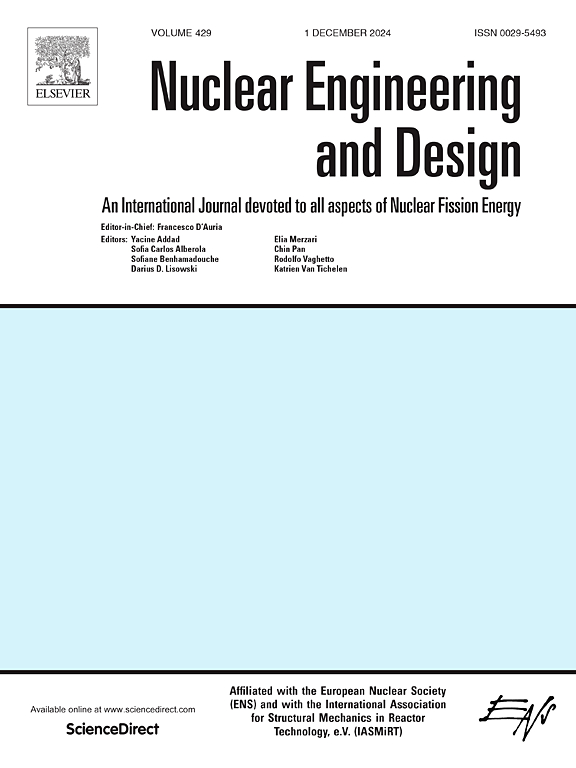适用于无源熔盐快堆的相变材料无源安全系统热性能评价
IF 2.1
3区 工程技术
Q1 NUCLEAR SCIENCE & TECHNOLOGY
引用次数: 0
摘要
相变材料(PCMs)已广泛应用于涉及热能管理的各个行业。在这项研究中,我们提出了一个利用PCMs的衰变热去除系统的概念。针对某目标反应堆,对含PCMs的被动安全系统(PSS)的热性能进行了评价。参考设计是被动熔盐快堆(PMFR),这是一种长寿命的堆芯设计,故意排除了在线燃料净化系统。然而,在这样的系统中,裂变产物的积累为衰变热去除带来了重大挑战,这是本工作旨在解决的问题。本文提出的基于pcm的PSS有望通过在正常运行期间提供有效的绝缘和在非正常条件下有效的衰变热去除来解决这些挑战。为了研究其可行性,对基于pcm的PSS的热性能进行了集中参数分析,重点关注热损失减少和余热去除能力。分析结果表明,热损失从名义功率的0.42%显著降低到0.114%是可以实现的,而在非正常条件下可以有效地去除衰变热。我们进行了参数化研究,以评估PCM性能和系统几何形状对热性能的影响,强调选择合适的PCM材料及其优化几何设计的重要性。结果表明,基于pcm的PSS可提高PMFR的安全性和有效性。本文章由计算机程序翻译,如有差异,请以英文原文为准。
Thermal performance evaluation of passive safety systems adopting phase change material applicable for passive molten salt fast reactor
Phase Change Materials (PCMs) have been widely applied across industries involving thermal energy management. In this study, we propose a decay heat removal system concept using PCMs. The thermal performance of the passive safety system (PSS) incorporating PCMs is evaluated for a target reactor. The reference design is the Passive Molten salt Fast Reactor (PMFR), a prolonged long-life core design that deliberately excludes online fuel purification systems. However, the accumulation of fission products in such systems introduces significant challenges for decay heat removal, which this work aims to address. The PCM-based PSS proposed in this paper is expected to resolve these challenges by providing both effective insulation during normal operation and effective decay heat removal during off-normal conditions. To investigate its feasibility, a lumped-parametric analysis is conducted to evaluate the thermal performance of the PCM-based PSS, focusing on heat loss reduction and residual heat removal capacity. The analysis results suggest that a significant reduction of heat loss from 0.42% to 0.114% of nominal power is achievable, while decay heat can be removed effectively during off-normal conditions. We perform parametric studies to assess the effect of PCM properties and system geometry on thermal performance, highlighting the significance of selecting appropriate PCM materials and its optimized geometrical design. The findings suggest that PCM-based PSS can enhance both safety and efficiency of PMFR.
求助全文
通过发布文献求助,成功后即可免费获取论文全文。
去求助
来源期刊

Nuclear Engineering and Design
工程技术-核科学技术
CiteScore
3.40
自引率
11.80%
发文量
377
审稿时长
5 months
期刊介绍:
Nuclear Engineering and Design covers the wide range of disciplines involved in the engineering, design, safety and construction of nuclear fission reactors. The Editors welcome papers both on applied and innovative aspects and developments in nuclear science and technology.
Fundamentals of Reactor Design include:
• Thermal-Hydraulics and Core Physics
• Safety Analysis, Risk Assessment (PSA)
• Structural and Mechanical Engineering
• Materials Science
• Fuel Behavior and Design
• Structural Plant Design
• Engineering of Reactor Components
• Experiments
Aspects beyond fundamentals of Reactor Design covered:
• Accident Mitigation Measures
• Reactor Control Systems
• Licensing Issues
• Safeguard Engineering
• Economy of Plants
• Reprocessing / Waste Disposal
• Applications of Nuclear Energy
• Maintenance
• Decommissioning
Papers on new reactor ideas and developments (Generation IV reactors) such as inherently safe modular HTRs, High Performance LWRs/HWRs and LMFBs/GFR will be considered; Actinide Burners, Accelerator Driven Systems, Energy Amplifiers and other special designs of power and research reactors and their applications are also encouraged.
 求助内容:
求助内容: 应助结果提醒方式:
应助结果提醒方式:


